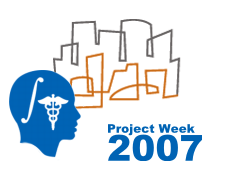Difference between revisions of "ProjectWeek200706:CorticalThicknessForAutism"
| Line 27: | Line 27: | ||
Our approach is to create an average cortical thickness map for each population and make statistical group comparison. | Our approach is to create an average cortical thickness map for each population and make statistical group comparison. | ||
| − | Our plan for the project week is first | + | Our plan for the project week is to first learn how to use FreeSurfer, and then to run it on several cases. |
| − | + | An appropriatness of the current pediatric atlas needs to be studied. We would also like to use our developped itkEMS tool, to | |
| + | A study comparison between our CortThick tool and Freesurfer needs to be done to study the process reliability. | ||
</div> | </div> | ||
Revision as of 17:57, 21 June 2007
Home < ProjectWeek200706:CorticalThicknessForAutism Return to Project Week Main Page |
[[|thumb|320px|Put any Images You have here]] | [[|thumb|320px|Put any Images you have here]] |
Key Investigators
- UNC: Heather Cody Hazlett, Martin Styner, Clement Vachet
- MGH: ?
Objective
Our goal is to measure cortical thickness evolution at two cross-sectional time periods (2 years with follow-up at 4 years) considering autistic children and controls, which include typical development and developmental delays. We want to be able to create an average cortical thickness map for each population and make statistical group comparison.
Approach, Plan
Our approach is to create an average cortical thickness map for each population and make statistical group comparison.
Our plan for the project week is to first learn how to use FreeSurfer, and then to run it on several cases. An appropriatness of the current pediatric atlas needs to be studied. We would also like to use our developped itkEMS tool, to A study comparison between our CortThick tool and Freesurfer needs to be done to study the process reliability.
Progress
This section will get filled out at the end of the Project week.